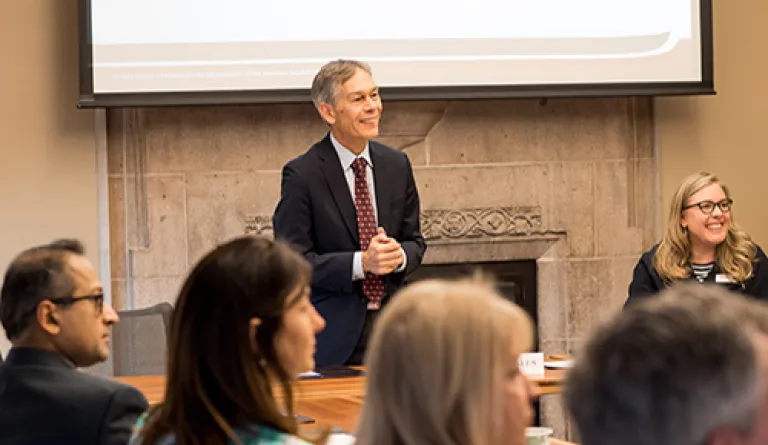Trading Gavels

In my first three months as Executive Director of IAALS, I have been able to visit with many of our partners and supporters in Colorado and across the nation. I’ve enjoyed these meetings and the uniformly encouraging welcome. When I introduce myself, three questions often follow: What drew me to IAALS from the Arizona Supreme Court? Do I miss being a judge? And what are my initial impressions and goals?
Serendipity, in part, answers the first question. About a year ago, I was completing my final year as Arizona’s Chief Justice and starting to think about doing something else after fourteen years on the bench. Out of the blue, I heard from Becky Kourlis that she contemplated retiring, and when she asked if I might be interested in being considered for her position, I was surprised but quickly replied that it sounded like a distinctly appealing opportunity.
IAALS was familiar to me from my work on the Arizona Supreme Court and the Conference of Chief Justices. Arizona, like Colorado, uses both judicial nominating commissions and judicial performance evaluations, and we looked to IAALS’ work to improve Arizona’s processes. While I was Chief Justice, we—like many other states—sought guidance from IAALS and the National Center for State Courts (NCSC) to help chart a path to civil justice reform to reduce the time and expense for litigants. Senior Director Brittany Kauffman worked with Arizona’s court committees to develop substantial improvements that many now view as possible models for other jurisdictions. We also considered IAALS’ recommendations for improving family court processes; IAALS is now working with Pima County, where Tucson is located, on one of four pilots for the Family Justice Initiative in partnership with NCSC. Becky and Director Natalie Knowlton also presented to Arizona’s annual court leadership conference on family court issues and on the use of unbundled legal services to expand access to justice.
So I had seen firsthand how effectively IAALS operates as an independent think-and-do tank. But other things also attracted me to IAALS. Most notable was the tremendous team that Becky had assembled. When I visited IAALS, I was struck by the energy, commitment, talent, and collegiality of everyone in the building. IAALS also works with a network of consultants, partners, and other supporters stretching from Hawaii to Maine—and beyond.
Moreover, like Becky, as a judge, I came to realize that achieving systemic improvements in our legal system rarely occurs through case-by-case adjudication. Although I deeply enjoyed my time on Arizona’s Supreme Court, I was pondering how I could best help to promote access to justice not only through better court processes, but also through changes in legal education and the delivery of legal services. IAALS is unique in its working across the range of issues affecting our legal system and with both federal and state courts. It also admirably defines its mission as seeking to improve the justice system for all who use it rather than advancing the interests of only certain constituents.
The answer to the second question is “no”; since coming to IAALS, I’ve not missed being a judge, though I do miss my former colleagues and working with law clerks and longtime court staff, and I have the highest respect for those who work in any role in our courts. I was very fortunate to have served on the bench. At the same time, I’ve never thought I was indispensable in any job, and I have long recognized that people can work in many ways to better our legal system and communities. And even though I gave up one gavel, Becky passed me another last September! But I did shed my judicial robe, so I’m more comfortable now being called Scott instead of justice or judge.
As for initial impressions, my first few months have only confirmed that working with others at IAALS is an incomparable opportunity to promote fair and accessible justice for all. We enter 2020 with many exciting and impactful projects underway, as are described in other blogs and across our social media (join us on Twitter, Facebook, and LinkedIn). My goal is for IAALS to expand its role as a catalyst for improving our legal system, recognizing especially the challenges and opportunities presented by technology, economic changes, and our nation’s growing diversity. In a time when public conversations too often are dominated by division and rancor, I think IAALS also vitally demonstrates the value of identifying policy recommendations by convening different perspectives and assessing problems and solutions through empirical research and reasoned discussion. With this approach and your support, IAALS will continue to help us achieve “Justice we can believe in.”
